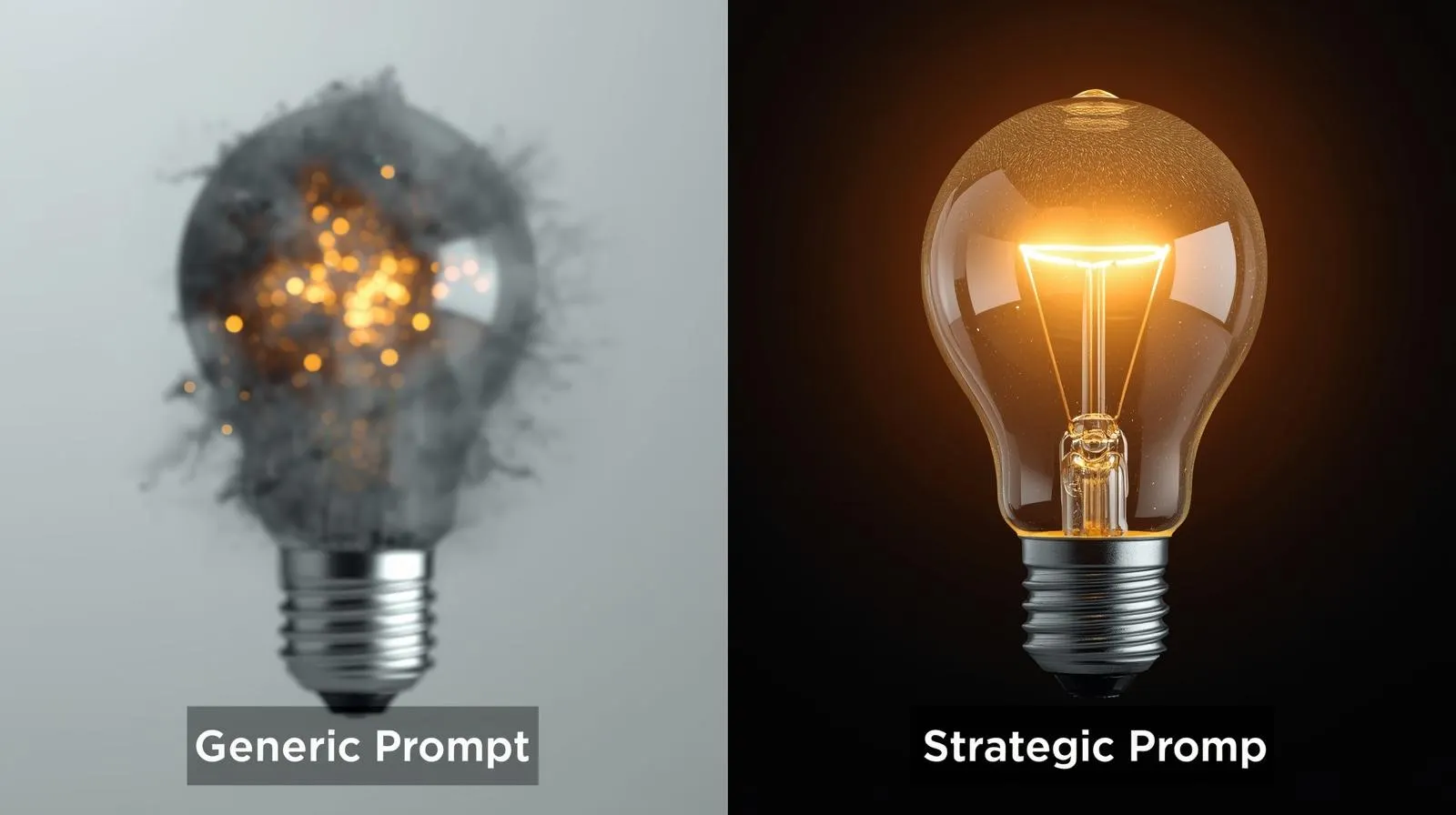The Difference Between a Generic Prompt and a Strategic Prompt (And Why It Matters for Your Brand)
Introduction: That "AI Content" Feeling... and How to Avoid It
We've all seen it: content that's bland, soulless, and obviously written by a robot.
You know that feeling. You read a piece of marketing copy, a social media post, or a blog article, and something just feels… off. It's grammatically correct, but it has no personality, no spark. It feels generic. This is the hallmark of lazy AI, and for a small business owner who relies on trust and connection, it’s a credibility killer.
It's a credibility killer. The problem isn't the AI; it's the prompt.
Many entrepreneurs try AI, get these bland results, and conclude that the technology isn't ready. The truth is, the AI is more than ready—it’s just waiting for better instructions. The difference between forgettable content and compelling copy comes down to one thing: the quality of your artificial intelligence prompt.
Defining the Two Types of Prompts
Effective prompts engineering starts with understanding the two fundamental approaches.
The Generic Prompt: A Simple Question
This is the most common type of prompt. It’s low-effort, provides no context, and simply asks the AI what to do. It’s a one-line command.
Example: "Write a blog post about time management."
Example: "Create a social media post for a sale."
This approach treats the AI like a simple vending machine and, unsurprisingly, receives a generic, pre-packaged-tasting result.
The Strategic Prompt: A Detailed Brief
A strategic prompt is completely different. It’s a detailed, thoughtful creative brief. It doesn’t just say what to do; it explains the who, why, and how. It provides context, defines the audience, assigns a personality, and sets a clear goal.
It's an instruction, not just a question.
It's the foundation of creating AI content that feels human.
A Tale of Two Prompts: A Side-by-Side Example
Let's make this tangible.
The Scenario: You run an e-commerce store selling handmade, eco-friendly candles, and you want to write a "Thank You & Welcome" email to a new customer after their first purchase.
The Generic Approach
Your Prompt: "Write a thank you email to a new customer."
The (Bland) AI Result:
Subject: Thank You For Your Order
Dear Customer,
Thank you for your recent purchase. We have received your order and it will be processed soon. We appreciate your business.
Sincerely,
The Team
This is technically correct, but it’s utterly forgettable and does nothing to build a brand.
The Strategic Approach
This is a true prompt engineering example.
Your Prompt: "Act as a warm and friendly e-commerce brand founder. Write a short 'Thank You & Welcome' email to a new customer who just made their first purchase.
My Brand: 'Luminosa Candles,' a small business selling handmade, eco-friendly soy candles. Our brand voice is calm, grateful, and passionate about sustainability.
Audience: Environmentally conscious consumers who value craftsmanship.
Goal: Make them feel appreciated and excited about their purchase, and subtly reinforce our brand values. Mention that each candle is hand-poured with care. End with a personal touch."
The (Superior) AI Result:
Subject: A heartfelt thank you from our little workshop!
Hi [Customer Name],
I just wanted to personally reach out and say thank you so much for your first order with Luminosa Candles. We know you have a choice, and it means the world to us that you chose our small, eco-conscious business.
Your new candle is being hand-poured with care right here in our workshop, and we can't wait for you to experience the calm and warmth it brings to your home.
Welcome to the Luminosa family!
Warmly,
Alex and the Luminosa Team
The difference is staggering. One is a transaction; the other is the beginning of a relationship.
Why the Difference is CRITICAL for Your Brand
Brand Perception & Credibility: Which email makes the business seem more professional and trustworthy? Generic content makes you look like every other faceless company. Strategic content showcases your unique brand identity and makes you look like a thoughtful authority in your space.
Customer Connection: A strategic prompt allows you to infuse your unique voice, personality, and values into every word. This is how you move beyond a simple transaction and build a loyal community of customers who feel connected to your mission.
True Efficiency: The generic email is a useless first draft. You'd have to rewrite the whole thing, wasting precious time. The strategic email is 95% ready to go. The 15 seconds it takes to write a better prompt saves you 15 minutes of frustrating edits. That’s a massive ROI.
The Shortcut to Strategic Prompts
Crafting a perfect strategic prompt for every situation takes thought and practice. You need to know what to include, how to phrase it, and what details matter most.
That's why we did the strategic work for you. Expert AI Prompts is a complete library of these pre-built strategic briefs. Each one is engineered to get you the warm, on-brand, and professional results you see in the second example, every single time.
Conclusion: Your Prompt is Your Brand's First Impression
In the age of AI, the quality of your ask determines the quality of your brand’s voice. Every prompt is a choice: do you want to sound generic, or do you want to sound like a brand your customers will love and trust?
Stop settling for generic. Start building your brand with every prompt. Explore Expert AI Prompts now.
Ready to learn how to build these powerful prompts yourself? Read our complete guide,
The Entrepreneur's Playbook for Prompt Engineering.
